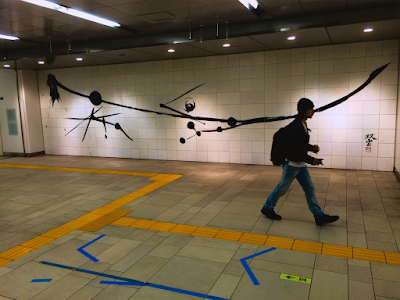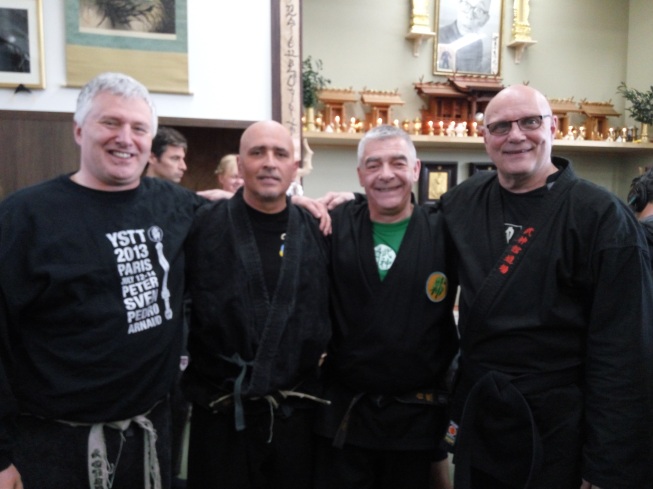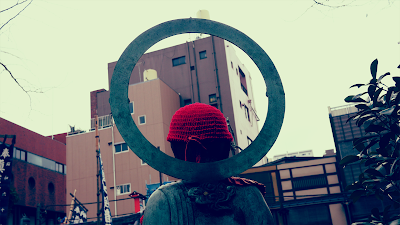From Bujinkan Santa Monica by Michael Glenn
 |
| Mural wall art at 明治神宮前駅 Meiji-Jingūmae station, photo by Michael Glenn |
If you’ve ever been to one of Hatsumi Sensei’s classes, you know that a lot depends on the mood. Yes, the Bujinkan Hombu Dojo has a mood. There is a feeling or sensation in the air. Where does this come from and how does it affect our training?
For example, during one recent class I was tired from training 2-3 classes every day for two weeks in Japan. But I showed up to the dojo in an expectant mood. In fact, it seemed there was a mood of anticipation among all of my training friends in the Hombu that Tuesday night. But, when Hatsumi Sensei arrived, his mood prevailed over all of us.
And during this class, he told us,
“I’m not teaching budo, I’m teaching the feeling of contemplation of a divine poem.”Well, I can only speak for myself… but I don’t think any of of us anticipated that this would be tonight’s lesson.
Before I describe more of what he taught that night, let me lead you back to heijōshin. Because this lesson is beyond what we think about martial arts or combat. It begins from owning the kukan in your own mind.
We often hear about 空間 kukan in Bujinkan training. It means space. Training helps us examine the spatial relationships between fighters, between ourselves and our opponents, and even the physical location of the fight.
But you may not know that 空間 kukan is both internal and external. The fight takes place in the minds of you and your opponent maybe more than in actual physical combat. We must use a fighting strategy that uses both the internal and external space.
That same night at the Hombu dojo, Hatsumi Sensei said,
“You have to be able to take the opponent with the kukan itself.”This is puzzling if you think only in terms of the physical. Yes, you can corner someone, or strategically position yourself to win through the proper use of space. But the real victory is when you own the internal space. Capture the opponent’s mind while freeing your own.
The word kukan uses the character 間 ma. This is a deep idea in Japanese thought. Where time is not linear, instead it is contained in the circle of nature. Space is not empty, instead it contains everything. Ma can be the space between things, between moments, or even between thoughts.
Ma can refer to the space between the technique you want to do in your mind and what you actually do physically. It can be the space between what the opponent expects you to do and what really happens. But it also can be the ability to see all of this at once as if from outside the fight.
That is another type of kukan. The space to see the whole fight including the internal struggles in the minds of both combatants. You might call that a divine insight. What if you could use that perspective?
Hatsumi Sensei used that perspective as he taught. First he showed us a technique and then watched us fighting to repeat what he demonstrated. But he didn’t let us struggle for very long. He gave us a tip for how to use this space in our minds,
“Don’t think of it as a contest. Don’t think about making it a fight. It’s not a contest. This is heijōshin. Don’t think anything.”This kind of 間 ma in the mind is necessary for heijōshin. That is one of the great challenges even in just entering the dojo. If we can’t even show up to class with that kind of mindset, what chance do we have in a fight?
 Organising and hosting such a big event as the Paris Taikai is always a challenge. Every year over 120 people from more than 20 countries gathers in the Bujinkan France dōjō for 3 days.
Organising and hosting such a big event as the Paris Taikai is always a challenge. Every year over 120 people from more than 20 countries gathers in the Bujinkan France dōjō for 3 days.


